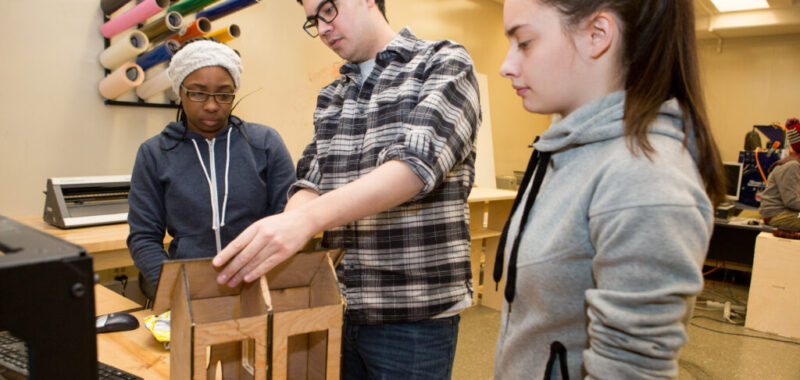
A teacher shows 12th grade students how to construct a small animal house.
Credit: Allison Shelley for American Education
Amid a statewide teacher shortage, talk of teachers leaving the profession or simply not going into it in the first place is widespread. In a 2022 UCLA study, 1 in 5 California teachers said they would probably or definitely leave the profession in the next three years because of burnout, low pay and student apathy and misbehavior.
But what about the teachers who are joining the profession? What motivates Gen Z students to go into teaching today, when it’s seemingly less lucrative and less attractive than ever?
One reason students like Katherine Osajima Pope — a recent University of California Santa Cruz graduate who is earning her master’s degree and teaching credential at Stanford University — decide to become teachers is to effect change. Osajima Pope wants to have a positive impact on her students, and, by extension, her community, “even if that’s one person at a time, or one classroom at a time.”
Chloe Decker, a rising senior at UC Berkeley, has noticed an increase in students who approach teaching from an advocacy perspective. As a peer adviser in UC Berkeley’s CalTeach program, through which undergraduates can gain teaching experience and even get their credentials, Decker regularly meets with students considering the teaching profession.

“I have seen so many inspired students excited for student advocacy. They want to change people’s lives, they want to be there for the kids, they want to be one person of influence that can change minds as to how they view education,” Decker said.
CalTeach and other undergraduate and graduate credential programs place a heavy emphasis on the role of teaching in equity and social justice. One of the required courses for CalTeach’s program focuses on equity in urban schools, and the program lists increasing “access, equity, and inclusion for STEM learning” as one of its core principles. Osajima Pope said she was “pleasantly surprised” by Stanford’s commitment to educating its students on anti-racism and equity.
Decker, who aims to become a teacher and then a school social worker, said she has seen a change in “what school actually means.” Beyond “just emphasizing academic requirements,” schools now see themselves as a support and social system for kids — and Decker and many of her peers are excited to engage in this aspect of the job.
“It’s just deeper than having them learn what one plus one is,” she said.
Excited by the idea that educators can do more than teach facts and figures, many future teachers plan to bring their own educational experiences into the classroom, while parting ways with some aspects of traditional pedagogy.
Osajima Pope has been working with children for years, volunteering at schools and libraries since she was a child. She called her educational experience growing up in Oakland “transformative,” and said she wants to go back as an ethnic studies teacher to “teach to the same person that (she) was.”
Susana Espinoza said her high school Spanish teacher exposed her to the world of Chicano/Latino studies, and she wants to similarly broaden students’ horizons. Espinoza, who is currently studying at UC Berkeley, remembers that Spanish class as the first time she saw herself reflected in the classroom, or in “any type of story that was told.”
Espinoza hopes to be “that one steppingstone” that allows students to achieve their dreams, as her teacher did for her.
While equity and access to education are powerful motivators, some future teachers are just as excited by the potential of a job that allows for creative expression and deep interpersonal connections. For Lindsay Gonor, a recent Cal Poly, San Luis Obispo graduate who is now earning a teaching credential there, it was working at a theater camp through her teen years that led her to education. Gonor said the experience contrasted with what she heard from her parents about their jobs, and specifically her father, who was a lawyer.
“I would ask (my dad) how work was, and he’d be like, ‘They don’t call it going to fun.’ And I was like, well, that’s not what I want to do. I work at the theater camp, and work is fun,” Gonor said.
These Gen Z-ers are not ignorant of the challenges that come with teaching. Decker said that each time CalTeach hosts a teacher panel, at least one speaker discourages the students from joining the profession — citing the common problems of low pay and long hours.
Gonor even acknowledged that her credential program is not a good “bang for your buck.” However, Gonor said, “The people that want to be teachers want to be teachers.”
Osajima Pope said she’s confronted with the realities of the job practically every time she tells someone her intended field, and she’s met with resistance. But for her, a part of the desire to teach is intrinsic, and possibly inexplicable.
“For me, my job isn’t about the money I make, it’s about what I feel passionate about,” Osajima Pope said. “It’s definitely hard to explain choosing happiness over money just because those two are equated so frequently, but I guess it was just (that) there’s literally nothing else I could see myself doing. Like, absolutely nothing else.”
Clara Brownstein is a third-year student studying English, Spanish and journalism at UC Berkeley, and a member of EdSource’s California Student Journalism Corps.

